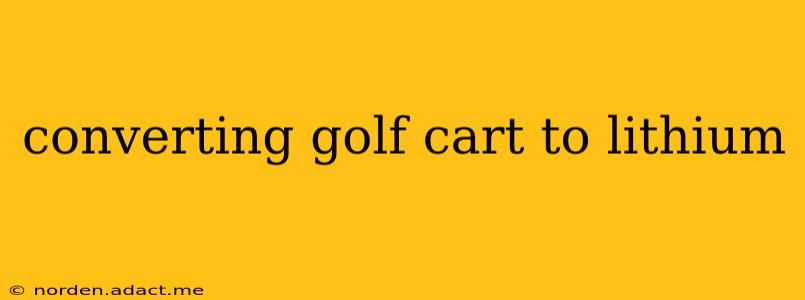Converting your golf cart to lithium batteries offers a significant upgrade in performance and convenience. Lithium-ion batteries boast a longer lifespan, faster charging times, and lighter weight compared to traditional lead-acid batteries. This guide will walk you through the process, addressing common questions and concerns.
Why Convert to Lithium?
The advantages of lithium-ion batteries for golf carts are undeniable:
- Longer Lifespan: Lithium batteries can endure significantly more charge cycles than lead-acid batteries, meaning fewer replacements over the cart's lifespan. Expect 2-3 times the lifespan, saving you money in the long run.
- Faster Charging: Charging times are drastically reduced. You can often achieve a full charge in a fraction of the time it takes to charge lead-acid batteries.
- Lighter Weight: Lithium batteries are considerably lighter, improving your golf cart's performance, especially on hills and uneven terrain. This reduced weight also extends the lifespan of your cart's components.
- Improved Performance: Experience consistent power throughout the discharge cycle, unlike lead-acid batteries which experience voltage drop. This translates to better hill climbing ability and overall responsiveness.
- Reduced Maintenance: Lithium batteries require minimal maintenance compared to lead-acid batteries, saving you time and effort. No need for watering or equalization charging.
What are the different types of Lithium batteries for golf carts?
Several lithium battery chemistries are available for golf cart conversions, each with its own set of characteristics:
- LiFePO4 (Lithium Iron Phosphate): This is a popular choice for golf carts due to its safety, long lifespan, and relatively low cost. It's known for its stability and resistance to thermal runaway.
- NMC (Nickel Manganese Cobalt): Offering high energy density, NMC batteries provide a longer range on a single charge. However, they are generally more expensive and may require more sophisticated battery management systems (BMS).
- LFP (Lithium Ferro Phosphate): This is essentially the same as LiFePO4, just a slightly different naming convention.
What size lithium battery do I need?
Determining the correct battery size depends on several factors:
- Your current battery setup: Note the voltage (typically 36V or 48V) and amperage-hour (Ah) rating of your existing lead-acid batteries. You'll need a lithium battery pack with a similar voltage and at least a comparable Ah rating.
- Your typical usage: Consider how frequently and intensely you use your golf cart. Higher Ah ratings provide longer runtimes.
- Available space: Ensure you have sufficient space in your golf cart to accommodate the lithium battery pack. While lighter, they may not always fit in the exact same space as lead-acid batteries.
Consult with a golf cart conversion specialist to determine the optimal battery size for your specific needs.
How much does it cost to convert a golf cart to lithium?
The cost of converting your golf cart to lithium varies depending on several factors, including the size of the battery pack, the type of lithium chemistry used, and the labor costs involved. Expect to pay anywhere from $1500 to $5000 or more for a complete conversion. DIY conversions can reduce costs but may require specialized knowledge and tools.
Do I need a new charger for a lithium battery golf cart?
Yes, you will almost certainly need a new charger specifically designed for lithium-ion batteries. Using a charger intended for lead-acid batteries can damage lithium batteries. The charger must be compatible with the voltage and chemistry of your new lithium battery pack.
Can I do a lithium golf cart conversion myself?
While a DIY conversion is possible, it requires significant electrical knowledge and experience. Incorrectly wiring or managing lithium batteries can be dangerous and potentially lead to fire or damage. If you're not comfortable working with high-voltage systems, it's best to have a professional perform the conversion.
What is a Battery Management System (BMS)?
A Battery Management System (BMS) is crucial for lithium battery packs. It monitors voltage, current, temperature, and state of charge (SOC) to ensure the safe and efficient operation of the battery. A BMS protects the battery from overcharging, over-discharging, over-current, and short circuits.
This comprehensive guide provides a solid foundation for understanding the process of converting your golf cart to lithium batteries. Remember to consult with a professional if you have any doubts or concerns. The benefits of improved performance, longer lifespan, and reduced maintenance are significant, making the investment worthwhile for many golf cart owners.
